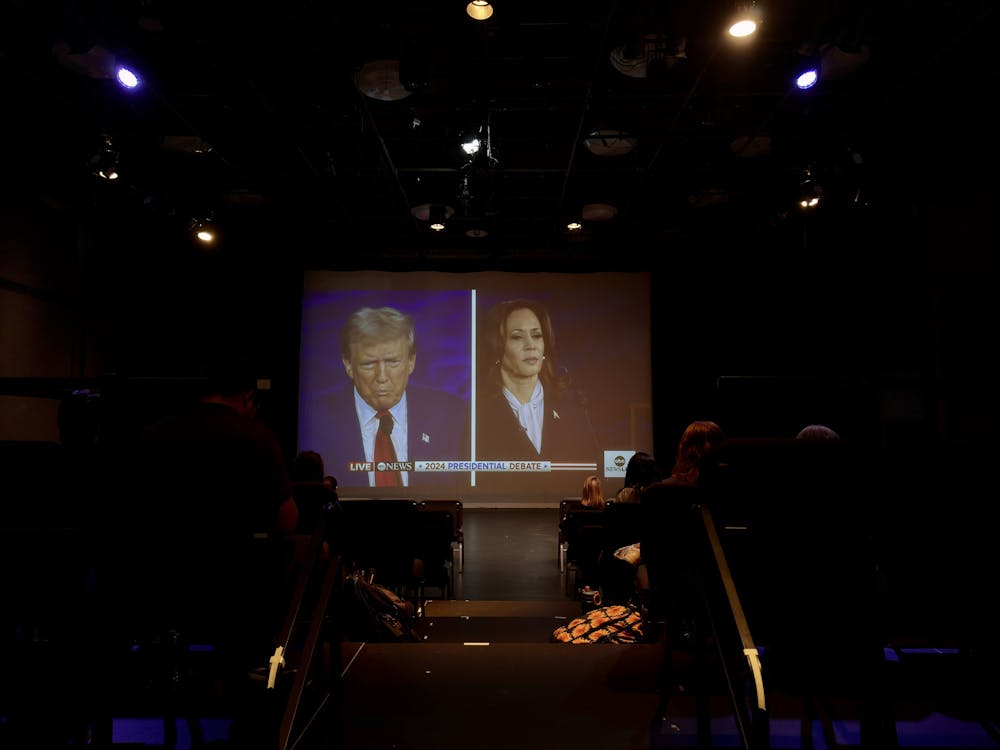By Matthew Kaufman
Editor-in-Chief
The School of the Arts and Communication hosted a watch party of the Sept. 10 United States presidential debate between Vice President Kamala Harris and former President Donald Trump, hoping to foster a productive and civil discussion among students, faculty and staff who attended the event in the black box theater in Kendall Hall.
Arts and Communication Dean Pamela Barnett, whose research focuses on nonviolent communication, led the discussion alongside political science professor Sara Morell. The two speakers presented for an hour prior to the debate on how to have civil political discussions, along with the importance of presidential debates.
“As a dean for a school of art and communication, I feel like we have a responsibility to help people communicate well about the issues that divide us, like this presidential election, like the Israel-Hamas war.”
The debate watch party was one of several held on campus. The TCNJ Democrats and the TCNJ College Republicans also hosted their own viewing events.
Barnett encouraged the audience to think about whether they would fear sharing their opinion in a room of others with divided opinions. Some students who spoke up reported that they might fear how others would perceive them or feel like they were being ignored.
Following Barnett’s thought exercises, Morell posed the question: Why do we have presidential debates?
While one debate may not swing large portions of the electorate one way or the other, Morell said, “debates matter because they cause people to pay attention.”
“73 million people watched the 2020 Trump-Biden debate, and 84 million people watched the first Trump-Clinton debate,” Morell said. “So 20 to 25 percent of the entire population of the United States watches this political event.”

Dean Pamela Barnett of the School of the Arts and Communication spoke alongside political science professor Sara Morell before the debate began (Photo by Matthew Kaufman).
Morell also emphasized how hot-button issues presented in a debate can shape political discourse for the rest of the campaign.
“I would argue that debates also matter because they tell you what the election is going to be about,” the political science professor said. “They lead to media attention about whether this is going to be an election about immigration or an election about abortion. And how the media frames the election is going to shape who is mobilized to vote.”
The impact of media was evident from the topics addressed by the moderators, as pointed out by Nikos DeGruccio, a senior communications major, who was in the audience.
“I think the moderators hit on topics that are very prevalent in the media right now, which is good because that’s what people are focusing on,” DeGruccio told The Signal. “And I think that they were also good at fact-checking both candidates on things in the moment, as they said things that were out of line.”
Throughout the stream, the audience was relatively calm as the candidates sparred. Besides a few snickers at certain moments, the group watched the politicians intently and quietly. The crowd also seemed to enjoy the split screen views presented by the stream, laughing mostly at Harris’s reactions to what Trump was saying.
Cathy Zheng serves as a TCNJ voting fellow working for TCNJ Votes!, which co-sponsored the debate watch event, to help increase voter turnout on campus. Zheng, a junior political science major, said events like this one can help get more students engaged with the campaign.
“Data shows that among our population, college-age peers, our voter turnout rates are lower than the national average,” Zheng told The Signal. “We’re really trying to change that. If we promote these conversations — these honest, civil dialogues — in college settings, then it sets us up for positive habits surrounding civic engagement going forward.”
While many college students may not be in tune with the latest election developments, Thomas O’Neal, a junior political science major in attendance at the event, told The Signal that he thinks students should be aware of what’s happening in the country.
“I think it’s important for us to understand what’s going on so that we can make informed decisions,” O’Neal said, “and so that hopefully one day we can be more civil towards one another.”







